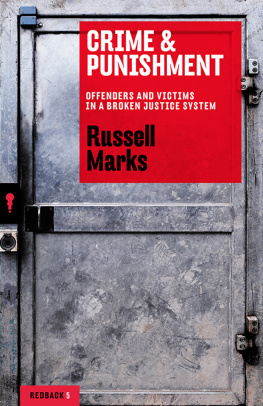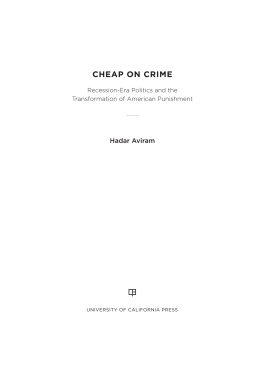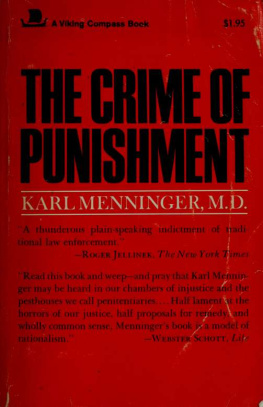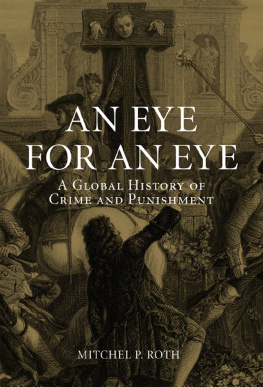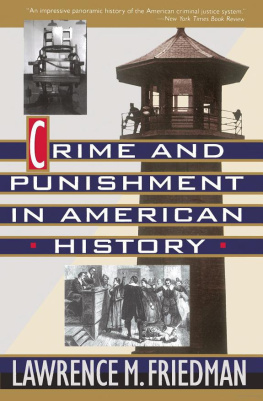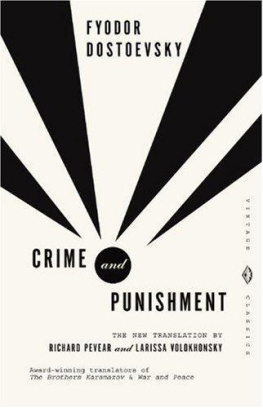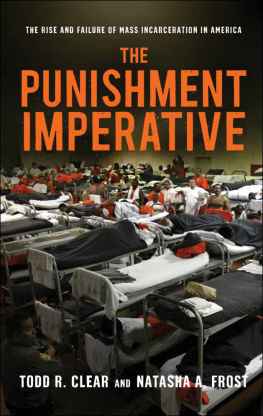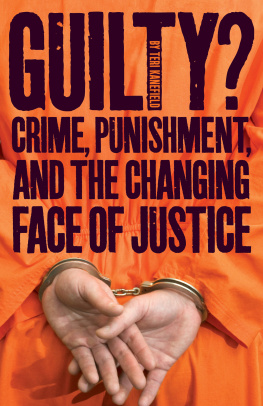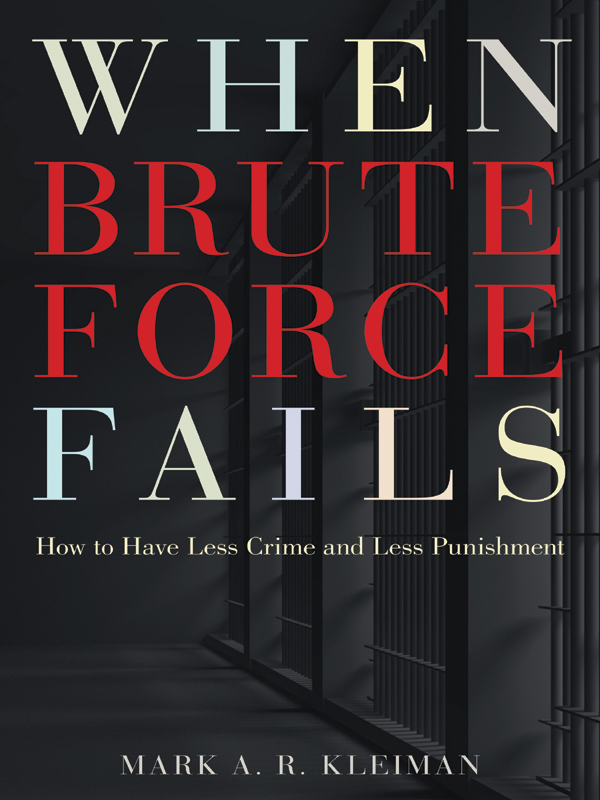Mark A. R. Kleiman
Published by Princeton University Press, 41 William Street, Princeton, New Jersey 08540
In the United Kingdom: Princeton University Press, 6 Oxford Street, Woodstock, Oxfordshire OX20 1TW
T HE L IBRARY OF C ONGRESS HAS CATALOGED THE CLOTH EDITION OF THIS BOOK AS FOLLOWS
Kleiman, Mark.
When brute force fails: how to have less crime and less punishment /
Mark A.R. Kleiman.
p. cm.
Includes bibliographical references and index.
ISBN 978-0-691-14208-1 (hbk.: alk. paper)
1. CrimeUnited States. 2. Crime preventionUnited States. 3. PunishmentUnited States. 4. Criminal justice, Administration ofUnited States. I. Title.
HV6789.K53 2009
364.40973dc22 2009019862
Printed on acid-free paper.
Work leading to this book was supported by grants from the National Institute of Justice and the Smith Richardson Foundation, and by sabbatical support provided by the UCLA Department of Public Policy and by the Thomas C. Schelling Visiting Professorship at the University of Maryland School of Public Affairs. None of the sponsors bears any responsibility for the content.
Brute force succeeds when it is used.
Effective deterrent threats are never carried out.
Thomas C. Schelling, Arms and Influence
ACKNOWLEDGMENTS
It is just as well that intellectual debts need only be acknowledged, rather than paid; else we would all die bankrupt. Looking back, I realize that I have been preparing to write this book for most of a lifetime, and my list of creditors is correspondingly long. For the most part, I have attempted to economize by naming each person only once. Within categories, names are listed in no particular order. No doubt some have been omitted by mere inadvertence; I sincerely beg their pardon for the oversight. Some are no longer with us, and I treasure their memory.

Studies of criminal careers all agree: When a young man gets involved with drugs and crime, it is usually because he has fallen in with the wrong crowd. The risk is especially grave if those he admires, and whose good opinion he craves, are themselves caught in the drugs-and-crime net. So it was in my case.
Thirty years ago, I was innocently engaged in running a small policy shop in the Boston mayors office when Philip B. Heymann was appointed assistant attorney general in charge of the Criminal Division of the U.S. Department of Justice. Phil had taught meor tried to teach mepolitics and public management at the Kennedy School of Government at Harvard. He was, and is, both an inspired and inspiring teacher and a great manager. One of his innovations in the Criminal Division was to create the Office of Policy and Management Analysis (OPMA), and to head it he hired Steven B. Hitchner, Jr. Steve had been a couple of years ahead of me in the Kennedy School master of public policy program and was already marked for greatness; only his tragic early death kept him from reaching the highest level of appointive office. The nation is the poorer for it, and Steves many friends continue to regret his untimely passing.
When Steve invited me to work with him and try to figure out how to prosecute public-corruption cases, I had no particular interest in the topic. I did, however, have in mind the advice every college freshman hears, Dont take courses; take professors. The chance to work with and for Steve and Phil was too good to pass up. So I joined OPMA, and my career in crime was launched. I have never reformed.
The Criminal Division was a high-morale, high-performance, high-integrity organization. In addition to treasured colleagues in OPMA, including Bud Frank, Bill Fisher, Irvinia Waters, and Julie Samuels, I learned from a dazzling array of fine lawyers and dedicated public servants across the division: Mark Richard, Irv Nathan, David Margolis, Mike DeFeo, Alec Williams, Bill Corcoran, Eric Holder, Kate Pressman, Ruth Wedgwood, and most of all the legendary Jack Keeney. Peter Bensinger and his colleagues in the Drug Enforcement Administration, including John Coleman, taught me the drug business and were remarkably tolerant of my fumbling attempts to make sense of how drug law enforcement could make a difference.
When Phil left at the end of the Carter administration, he was replaced first by Lowell Jensen and then by Steve Trott, who continued my education and earned my deep admiration. I began to collaborate with Peter Reuter at RAND and Susan Ginsburg at the State Department; those two partnerships remain among my most prized resources.

I came to the Justice Department pig-ignorant about its work, but well prepared to learn, thanks to many teachers, starting with my parents, who raised me to prize understanding and to believe in public service. My formal education took place at Elementary School #64, at Pimlico Junior High, at Baltimore City College (actually a high school), and Northwestern High School.
Rhoda Bennett, my first and second grade teacher, taught me that learning could be a source of joy; a child who learns that will eventually learn whatever else he needs to know.
Several people taught me how to write and (the essential prerequisite) to care about writing and to tell good writing from bad; if there is a more demanding art form than English expository prose, I cant imagine what it might be. Mrs. Hergenroeder (I dont think it occurred to me that she might have a first name) who taught seventh grade American history, assignedand correctedan essay every night for an entire year, starting with a sentence and working up to 250 words. Her corrections were as much about writing as they were about history, and by the end of the year I could write three consecutive paragraphs without gross errors of grammar or style. Berniece Baer in eighth grade English diagrammed sentences, although the official curriculum no longer allowed it. Stephanie Miller, whose subject was chemistry but who also served as adviser to the school newspaper, initiated me into the mystery of journalistic prose and into the attitude that all writing, including my own, is mere copy, capable of being improved, and needing to be improved, by editing. It was not until later that I heard the Golden Rule of proseThere is no such thing as good writing, only good re-writingbut it was as the copyeditor of the Pimlico Pacesetter that I learned the attitude it expresses. The book you hold is, on average, about a fifth draft.
It was about then that I began to encounter the masters of expository and argumentative writing, whose skill I have been trying to emulate ever since: Bertrand Russell, John Kenneth Galbraith, George Orwell, C. S. Lewis, Michael Walzer, Thomas C. Schelling, and Abraham Lincoln.
Angelo Fortunato, in a single class on the economic origins of the Reformation, gave me a taste for both historical analysis and political economy. Eileen Henze, in the course of teaching Shakespeare, started me on my lifelong love affair with English history. Herbert Bernhardt opened my eyes to the beauty of mathematical reasoning. I recall with affection schoolmates including Arthur Cohen, Steve Krafchik, Ellen Rothman, Stuart Levine, Jeff Liss, Susan Michaelson, and Judy Shub.



